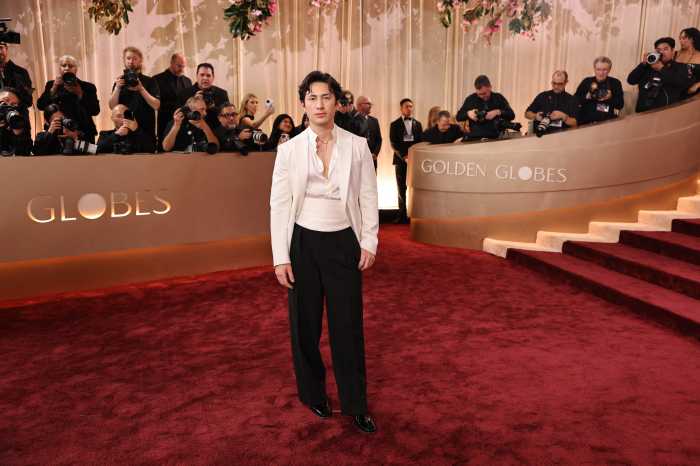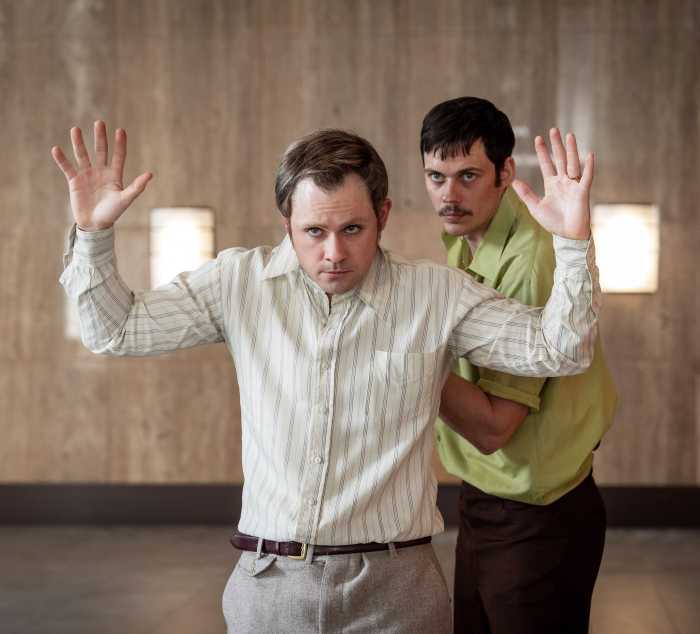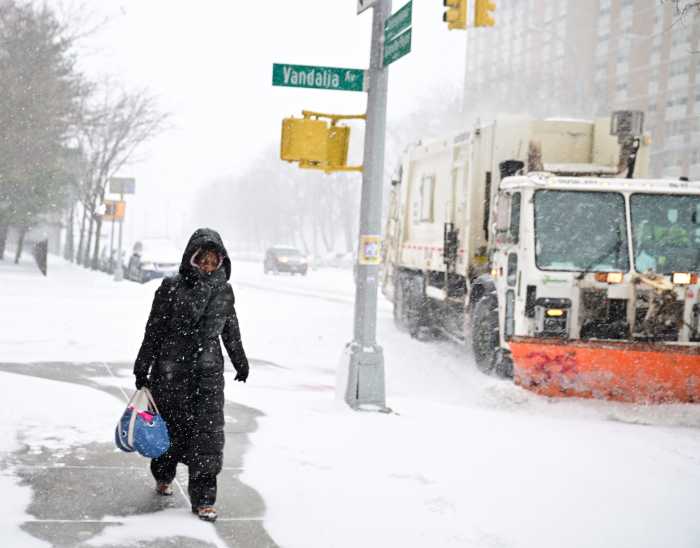This year, there are more than a dozen LGBTQ feature and documentary films screening at the Tribeca Film Festival. While several entries — “Afire,” “Every Body,” and “Shortcomings” — are being released this summer, some films will be having their World Premieres at the festival. Here is a rundown of nearly a dozen LGBTQ films screening in this year’s program.
“Afire”
There is some homoerotic tension between Leon (Thomas Schubert), an uptight writer and his friend, Felix, (Langston Uibel) at the start of writer/director Christian Petzold’s drama set largely in and around a house near the Baltic Sea, where fires are raging. It is at the house — owned by Felix’s family — that the guys meet Nadja (Paula Beer) who is also staying there, and Devid (Enno Trebs), a “rescue swimmer” (i.e., lifeguard) at the nearby beach. The tensions run high as Leon wants to work on his manuscript and Felix tries to distract him. Leon also has trouble sleeping because Nadja is having loud sex every night. Leon’s irritability extends towards Devid, who tells a long story that ends with Devid kissing Felix. It is kind of comic — except to the depressed Leon, who takes things very seriously. The dynamic changes further with the arrival of Leon’s publisher, Helmut (Matthias Brandt). This involving chamber piece benefits from strong performances by Schubert, who conveys Leon’s anxiety and jealousy well with his coiled expressions and body language. The queer content is best left to be discovered, but like this intriguing film, it is rewarding.
“Bad Things”
A psychological thriller by queer writer/director Stewart Thordike,”Bad Things” has Ruthie (a grating Gayle Rankin) considering whether to sell the possibly haunted hotel she inherited. Her girlfriend Cal (Hari Nef) thinks it would be fun to own the place; it may help them refresh their rocky relationship. But Ruthie has a flirtatious encounter with Fran (Annabele Dexter-Jones), and their mutual non-binary friend, Maddie (Rad Pereira), declares their love for Cal. The tangled romances are actually less interesting than the few scenes where characters are being chased by someone wielding a chainsaw. Thorndike makes fine use of the abandoned hotel setting with eerie shots of empty rooms and hallways, as well as some standard is-this-real-or-a-hallucination moments, but this low-key thriller is too slow and muddled to generate much in the way of thrills, and the characters are as thin as the hotel’s walls.
“Breaking the News”
“Breaking the News” is an observational and interview-based documentary about founding and evolution of the “non-partisan, non-profit newsroom,” The 19th*, which looks at politics and policy through a gendered lens. The emphasis is initially on women, but gender soon becomes essential as trans writer Kate Sosin’s LGBTQ reporting goes viral. Sosin emphasizes the need for the newsroom to be more trans and gender inclusive. Likewise, editor-at-large Errin Haines focuses on covering stories about women of color, from the horrific killing of Breonna Taylor to the historic moment when Kamala Harris was named Joe Biden’s running mate. Haines also addresses white women’s racism in the Central Park birder story. As the site’s cofounder, Emily Ramshaw, admits her mistakes and blind spots, “Breaking the News” can feel like a self-congratulatory portrait, but the site’s coverage of everything from diaper banks to trans healthcare to the repeal of Roe v. Wade ensures this film is sure to satisfy news junkies.
“Chasing Chasing Amy”
“Chasing Amy” is an affectionate documentary by queer director Sav Rodgers, who once gave a TED Talk about how Kevin Smith’s film “Chasing Amy” saved his life. The 1997 film—about a straight guy (Ben Affleck) who falls for Alyssa (Joey Lauren Adams, then Smith’s girlfriend), a lesbian—was both provocative and problematic for its representation of sexual identity. However, for Rodgers, the film presented positive queer characters that brought solace during his difficult teenage years. As “Chasing Chasing Amy” shows, the film made Rodgers be honest with himself. After coming out as queer and falling in love with Riley, Rodgers comes out as a trans man. Featuring extensive and informative interviews with Smith and Adams about their film and its legacy, this is an impassioned documentary about personal growth, and the power of cinema.
“Dead Girls Dancing”
“Dead Girls Dancing” has three female friends — Ira (Luna Jordan), Ka (Noemi Liv Nicolaisen), and Malin (Katharina Stark) — taking a road trip to Italy after graduating high school. After they meet Zoe (Sara Giannelli) at a motel and get kicked out, the four drive off, only to get stranded in the middle of nowhere with a flat tire. Happening upon an abandoned village, they break into a residence and figure out their next move. “Dead Girls Dancing” showcases how these young women experience freedom — and the responsibility that comes with it — as it builds slowly to the girl’s being discovered. There is also an unspoken, simmering sexual tension between Ira and Zoe. Writer/director Anna Roller’s film is slight overall, but it features a stylish episode of the girls robbing a grocery store, and the performances by Jordan and Nicolaisen, especially, stand out.
“He Went That Way”
“He Went That Way” is not a queer film per se, but one can read the tightly wound Jim (out gay Zachary Quinto) as queer, given how he dresses and the sexual tension between him and Bobby Falls (Jacob Elordi), the smoldering and possibly dangerous hitchhiker he picks up in 1964. Jim is driving to Chicago for an event. His cargo is Spanky (Phoenix Notary), a performing chimpanzee. Bobby is impressed by Spanky, but he still robs Jim of his wallet and ring — perhaps as an insurance measure to avoid an unpleasant situation (e.g., the police). How the two men interact over the course of their three days together involves several reversals of fortune, from a stop to see Jim’s brother-in-law, Saul (Patrick J. Adams), to a pair of young girls they pick up in Tulsa. “He Went That Way” is based on a true story, which is quite amazing, but it is the performances by Quinto and Elordi that keep viewers transfixed.
“Marinette”
“Marinette” is an efficient and effective biopic of Marinette Pichon (Garance Marillier), who is encouraged to play soccer as a young girl. It becomes her lifeblood and her livelihood, saving her from trauma at home — her father (Alban Lenoir) is criminally abusive. But there are obstacles around her playing, including the lack of opportunities for female players to rivals on a national team and the financial inequality women experience compared to the men’s team. As Marinette works her way through the ranks and experiences setbacks, she eventually gets a pro contract to play in Philadelphia, where she becomes an MVP. “Marinette” tracks the out athlete’s personal and professional hardships, from a relationship with a woman (Louisa Chas) to losses at key games, but Marinette is always an inspiration, leading her teammates and scoring record-breaking goals, or being critical of the federation for its lack of respect for women. Marinette Pichon may not be well known in the US, but the ingratiating “Marionette” will prompt instant fandom.
“Our Son”
“Our Son” has Nicky (Luke Evans) and Gabriel (Billy Porter) heading for a gay version of “Kramer vs. Kramer” after Gabriel decides to leave their marriage. While Nicky is devastated, the sticking point becomes the escalating battle for primary physical custody of Owen (Christopher Woodley), their 8-year-old son. Whereas Nicky, the biological father, has been the breadwinner, Gabriel sacrificed his career to parent their child. Both Evans and Porter convey a wistfulness in their sensitive performances. Nicky is obviously hurting and adrift after the life and family that he thought was secure implodes. Meanwhile, Gabriel determines what he truly wants in life — and that absolutely includes Owen. Director/cowriter Bill Oliver thankfully never lets his film get maudlin as the drama plays out in ways that reveal the humanity that drives each character. This is a compelling film that takes a thoughtful approach to the idea of loving and letting go.
“Playland”
“Playland” is an artfully made queer memory piece/time capsule about the titular late Boston café/gay bar. Director Georden West assembles a queer cast of performers, including Lady Bunny, who reenact scenes from the past such as drag performances and opera. The highly stylized vignettes feature fabulous costumes and period details. Equally notable are the voiceovers, archival footage, and news clips that recount anecdotal histories ranging from the publication of “Fag Rag,” a gay magazine, to Pride parades, protests, and racial tensions around busing. This hypnotic experimental film captures a mood and moments in history. However, it will frustrate viewers who prefer a more traditional documentary on the venue.
“Rock Hudson: All That Heaven Allowed”
“Rock Hudson: All That Heaven Allowed” is a fleet documentary that recounts — for anyone who wasn’t aware — that Roy Harold Scherer, Jr., aka Rock Hudson, was a famous movie star who was closeted and died of AIDS complications. The film, directed by Stephen Kijak, uses photographs and judiciously selected interviews and film clips to winkingly comment on Hudson’s sexuality, while emphasizing that he could not live openly gay, but could be seen sharing a one-bedroom “bachelor pad” with another handsome actor in publicity magazines. Hudson was also pressured to get married, which he did — days before his 30th birthday — to Phyllis Gates, his gay agent Henry Wilson’s secretary. (She claimed, like several others, not to know Hudson was gay). The actor’s celebrity was cemented by his work in glossy melodramas including “Magnificent Obsession” and “All that Heaven Allows” (both co-starring Jane Wyman, and directed by Douglas Sirk), as well as his Oscar-nominated role in “Giant.” Other key films are showcased, like his part in “Pillow Talk” where Hudson, a gay man, playing straight and pretending to be gay, is cringey, as well as his playing-against-type turn in “Seconds,” an under-appreciated John Frankenheimer film. But off screen, Hudson had many relationships with men (including Lee Garlington and Armistead Maupin, both interviewed here) that fueled rumors, including a “fake marriage” to Jim Nabors that was reported in the “National Enquirer.” He also ended up on the FBI watch list. “Rock Hudson: All that Heaven Allowed” culminates with Hudson’s battle with AIDS, and how it was kept a secret — even compromising things for actress Linda Evans, whom he kissed on an episode of “Dynasty.” That Hudson became an unexpected activist by being the most famous person to die from AIDS is a point the documentary makes, but like much of the superficial “Rock Hudson: All that Heaven Allowed,” it does not provide any real insight.
“Transition”
“Transition” is an intriguing documentary, co-directed (with Monica Villamizar) by its subject, Jordan Bryon, a reporter in Afghanistan who is also transitioning to become a man. Jordan’s gender dysphoria is notable, as he “just wants to be seen like I feel,” and is more comfortable as an anonymous man in Afghanistan than in a gay bar in Sydney. “Transition” explores that interesting idea as Jordan questions gender roles in the Middle East. Moreover, he finds that the deeper he gets into the Taliban’s world, the harder it is for him to keep his personal and professional lives separate. As he hopes to keep Afghanistan in the news, get his surgery in Iran, and help his cameraman, Teddy, leave Afghanistan, Bryon takes on a lot — and his impassioned documentary takes viewers along with him.




































